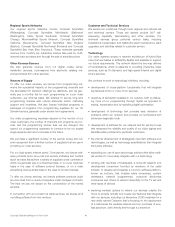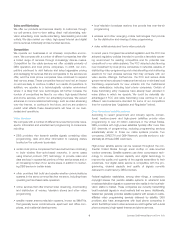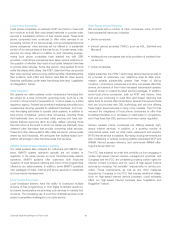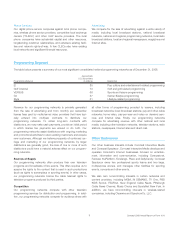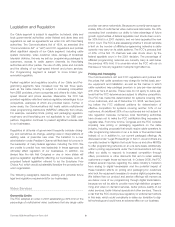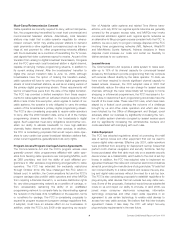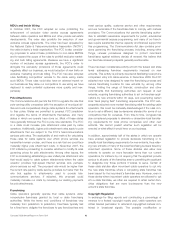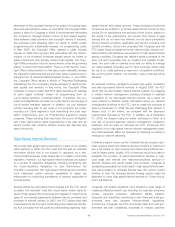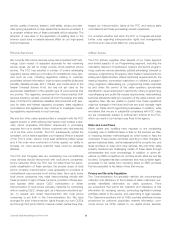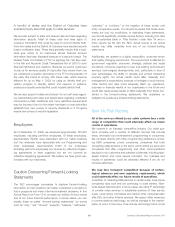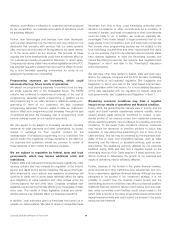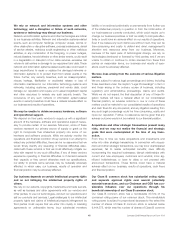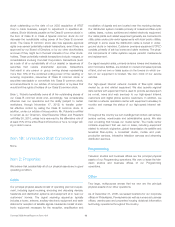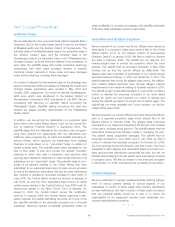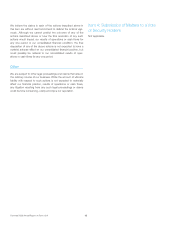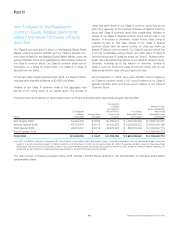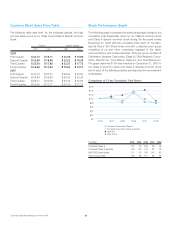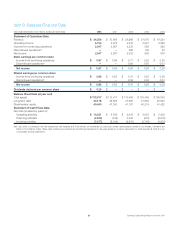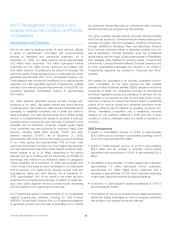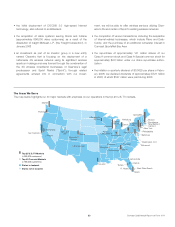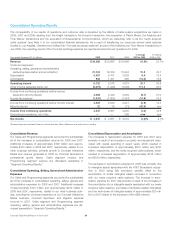Comcast 2008 Annual Report Download - page 16
Download and view the complete annual report
Please find page 16 of the 2008 Comcast annual report below. You can navigate through the pages in the report by either clicking on the pages listed below, or by using the keyword search tool below to find specific information within the annual report.effective, cost-efficient or attractive to customers as that employed
by our competitors, our business and results of operations could
be adversely affected.
Further, new technologies and services have been developed,
such as video streaming over the Internet, and may continue to be
developed that compete with services that our cable systems
offer, and such services may not be regulated in the same manner
or to the same extent as our services. The success of these
ongoing and future developments could have an adverse effect on
our business and results of operations. Moreover, in recent years,
Congress and various states have enacted legislation and the FCC
has adopted regulatory policies that have had the effect of provid-
ing a more favorable operating environment for some of our
existing and potential new competitors.
Programming expenses are increasing, which could
adversely affect our future results of operations.
We expect our programming expenses to continue to be our larg-
est single expense item in the foreseeable future. The MVPD
industry has continued to experience an increase in the cost of
programming, especially sports programming. In addition, as we
add programming to our video services or distribute existing pro-
gramming to more of our customers, we face increased
programming expenses. If we are unable to raise our customers’
rates or offset such programming cost increases through the sale
of additional services, the increasing cost of programming could
have an adverse impact on our results of operations.
We also expect to be subject to increasing demands, including
demands for cash payments and other concessions, by broad-
casters in exchange for their required consent for the
retransmission of broadcast programming to our customers. We
cannot predict the magnitude of these demands or the effect on
our business and operations should we concede to certain of
these demands or fail to obtain the required consents.
We are subject to regulation by federal, state and local
governments, which may impose additional costs and
restrictions.
Federal, state and local governments extensively regulate the video
services industry and may increase the regulation of the Internet
service and digital phone service industries. We expect that legis-
lative enactments, court actions and regulatory proceedings will
continue to clarify and in some cases adversely affect the rights
and obligations of cable operators and other entities under the
Communications Act and other laws. Congress considers new
legislative requirements potentially affecting our businesses virtually
every year. The results of these legislative, judicial and admin-
istrative actions may materially affect our business operations.
In addition, local authorities grant us franchises that permit us to
operate our cable systems. We have to renew or renegotiate these
franchises from time to time. Local franchising authorities often
demand concessions or other commitments as a condition of
renewal or transfer, and these concessions or other commitments
could be costly to us. In addition, we could be materially dis-
advantaged if we remain subject to legal constraints that do not
apply equally to our competitors, such as if local phone companies
that provide video programming services are not subject to the
local franchising requirements and other requirements that apply
to us. For example, the FCC has adopted rules and several states
have enacted legislation to ease the franchising process and
reduce franchising burdens for new entrants. See “Legislation and
Regulation” in Item 1 and refer to the “Franchising” discussion
within that section.
We also face other risks related to federal, state and local regu-
lations. For example, Congress and the FCC are also considering
various forms of “net neutrality” regulation. See “Legislation and
Regulation” in Item 1 and refer to the “High-Speed Internet Serv-
ices” discussion within that section. For a more detailed discussion
of the risks associated with our regulation by federal, state and
local governments, see “Legislation and Regulation” in Item 1.
Weakening economic conditions may have a negative
impact on our results of operations and financial condition.
During 2008, the global financial markets were in turmoil, and the
equity and credit markets experienced extreme volatility, which
caused already weak economic conditions to worsen. A sub-
stantial portion of our revenue comes from residential customers
whose spending patterns may be affected by prevailing economic
conditions. To the extent these conditions continue, customers
may reduce the advanced or premium services to which they
subscribe, or may discontinue subscribing to one or more of our
cable services. This risk may be worsened by the expanded avail-
ability of free or lower cost competitive services, such as video
streaming over the Internet, or substitute services, such as wire-
less phones. The weakening economy affected our net customer
additions during 2008 and also had a negative impact on the
advertising revenue of our Cable segment. If these economic con-
ditions continue to deteriorate, the growth of our business and
results of operations may be adversely affected.
Further, because of the turmoil in the global financial markets,
some financial and other institutions have experienced, and con-
tinue to experience, significant financial distress. Although we have
attempted to be prudent in our investment strategy, it is not
possible to predict how the financial market turmoil and the
deteriorating economic conditions may affect our financial position.
Additional financial institution failures could reduce amounts avail-
able under committed credit facilities, could cause losses to the
extent cash amounts or the value of securities exceed government
deposit insurance limits and could restrict our access to the public
equity and debt markets.
Comcast 2008 Annual Report on Form 10-K 14


